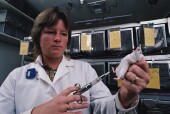
FRIDAY, Nov. 30 (HealthDay News) — Like humans, rats also experience the “placebo effect,” or a positive response to fake treatments, according to a new study.
Researchers from the University of Florida suggest their findings could lead to new treatment strategies for a number of health problems.
“That was the big finding — that the animals that expected pain relief actually got pain relief when you gave them an inert substance [in this case, salt water],” the study’s co-author John Neubert, a pain specialist and an associate professor with the University of Florida College of Dentistry department of orthodontics, said in a university news release. “It helps validate our model that what we do in the rats, we believe, is a good representation of what’s being seen in humans.”
In conducting the two-year study, the researchers repeatedly injected rats with either the pain-relief drug morphine or salt water. Over time, the rats who were given morphine were conditioned to expect pain relief.
During a following session, however, all of the rats were injected with salt water. Still, 30 to 40 percent of the rats that had previously been given morphine acted as if they had been given the pain reliever again.
“What that means is we can then go ahead and do more mechanistic studies and do pharmacological studies targeting different receptors. We could do different procedures and try to apply that knowledge into what we think is going on in humans,” Neubert explained. “We know basic things about placebo response, but the study we did is important because now we can look at placebo response in ways that you can’t in humans due to practical and ethical issues.”
The study, which was co-authored by Niall Murphy, an addiction specialist and adjunct associate professor at the University of California, Los Angeles, was published in a recent issue of the journal Pain.
Experts note that results from animal research are not always replicated in humans.
More information
The American Cancer Society has more about the placebo effect.

